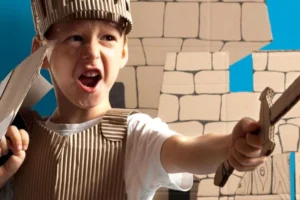The friendship started innocently enough. My 10-year-old son wanted to welcome Jack into our neighborhood. He offered Jack one of his favorite toys: a pogo stick. The gift was a generous gesture. I was proud of his thoughtfulness, but puzzled over why he gave away something so valuable to someone he didn’t yet know.
The following week, Jack came over to play, and I overheard their conversation. My son wanted to ride bikes; Jack didn’t. Without hesitation, my son said, “Yeah, I didn’t want to ride bikes anyway,” and they ran off to play Jack’s game.
Then one day Jack decided he didn’t want to play with another boy in the neighborhood, a kid my son had been friends with for years. My son had to choose: risk losing Jack’s friendship by remaining loyal to the other boy or reject a longtime friendship in the hopes of pleasing his new friend. That’s when I realized the pogo stick, bike-riding and friend-choosing were costing my son far more than he realized: He was losing his identity.
As parents, we want our kids to fit in and have friends, but we don’t want them to bankrupt their sense of identity in the process. So how do we encourage them to navigate social pressure in a healthy way? It begins by helping them internalize three identity anchors.
A loving God intentionally created you
Every week, our children feel pressure from media and peers to look a certain way, act a certain way or buy a specific product to earn status and acceptance. Behind this pressure sits a powerful message: Who you are isn’t good enough. You need to do or buy this.
But Genesis says we’ve been created in the image of God, formed by His hand (1:27; 2:7). That means our children bear the unique imprint of God’s creative genius. My role as a parent isn’t to help my child become like other children or fit in, but to help him recognize God’s unique fingerprint on his life.
Much as a curator appreciates the nuances of art, we can help our children develop a sense of curiosity about themselves and their Creator. Ask questions about their interests. Pay attention to likes and dislikes, quirks and characteristics. Let your kids know that living as God’s creation creation isn’t about proving and earning, but being.
When my son fears his love of Legos is uncool or his tender heart is too emotional, I reassure him that God created him as a unique expression of His glory. To change it or hide it would be to miss out on a divine masterpiece.
You are flawed and forgiven
I’m guessing you already know this, but our kids aren’t perfect. Neither are we. Rather than allowing mistakes and bad choices to create separation, use them to connect. Engage in an ongoing conversation with your children about our core problem: sin. The good news? Jesus “came to seek and to save the lost” (Luke 19:10).
A secure identity isn’t grounded in talents and successes. Our kids need more than self-esteem, they need self-awareness. The most secure people are those who can own both their strengths and their weaknesses. The best way to help your child do this is to model it on a daily basis.
For a long time, I struggled to apologize to my children. I felt my confessions would diminish my authority. But the opposite proved true. My kids knew I’d failed, even if I didn’t admit it. My lack of ownership merely communicated an intolerance of imperfection and created an environment of shame. When I owned my mistakes, however, I gave my children freedom to own their own.
You are safe, wanted and loved
Identity can only be as strong as its safest relationship. Ultimately, our child’s safest relationship is with God himself. However, my relationship with my child is the doorway to his relationship with God. That means, his sense of security in God’s love is significantly influenced by his security in mine.
To create an environment of safety with our children, we need to do more than correct their behavior. We need to engage with their hearts.
When I realized what was happening with my son, I knew it was time for a one-on-one talk. I asked him what he liked about Jack, why he wanted to be friends with him and what made someone a good friend.
When he expressed his fear of losing Jack’s friendship, I withheld criticism and made space for him to process complicated feelings. And I tried to listen to his opinion even when I disagreed. In the process, I was able to get to the heart of his conundrum and help him talk through it, rather than simply dictating his course of action. It took time, but he eventually recognized that Jack’s behavior wasn’t consistent with a good friend.
It’s been some time since that conversation with my boy. And we’ve shared more conversations about his friend choices since then. It’s a struggle for my son to stay grounded in who he is while in relationship with others. I get it. It isn’t easy for me either.
But identity isn’t built; it’s received. It’s an ongoing process of discovery, of receiving God’s Word instead of the words of the world. And this receiving is done best in community — in family.
Michele Cushatt is a speaker and the author of Undone and I Am: A 60-day jouney to knowing who you are because of who He is.


















